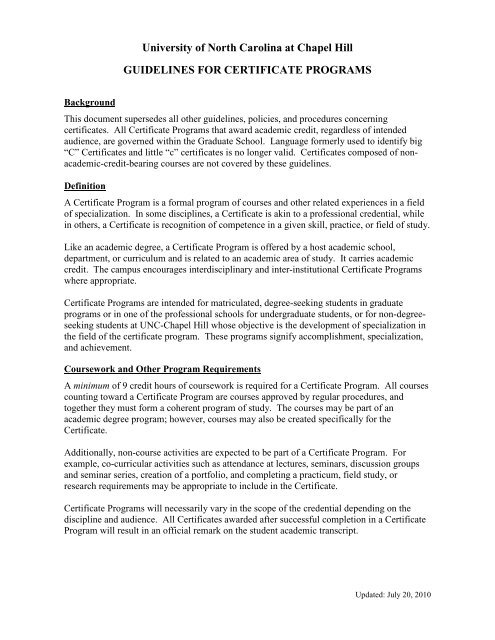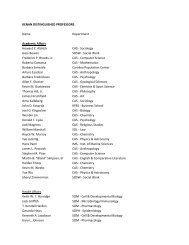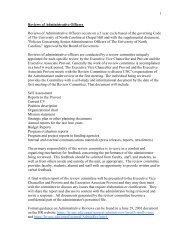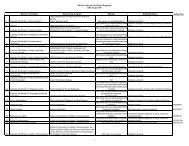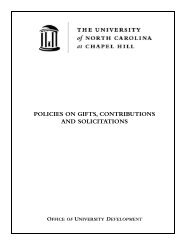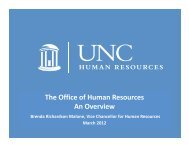Guidelines for Certificates
Guidelines for Certificates
Guidelines for Certificates
Create successful ePaper yourself
Turn your PDF publications into a flip-book with our unique Google optimized e-Paper software.
University of North Carolina at Chapel Hill<br />
GUIDELINES FOR CERTIFICATE PROGRAMS<br />
Background<br />
This document supersedes all other guidelines, policies, and procedures concerning<br />
certificates. All Certificate Programs that award academic credit, regardless of intended<br />
audience, are governed within the Graduate School. Language <strong>for</strong>merly used to identify big<br />
“C” <strong>Certificates</strong> and little “c” certificates is no longer valid. <strong>Certificates</strong> composed of nonacademic-credit-bearing<br />
courses are not covered by these guidelines.<br />
Definition<br />
A Certificate Program is a <strong>for</strong>mal program of courses and other related experiences in a field<br />
of specialization. In some disciplines, a Certificate is akin to a professional credential, while<br />
in others, a Certificate is recognition of competence in a given skill, practice, or field of study.<br />
Like an academic degree, a Certificate Program is offered by a host academic school,<br />
department, or curriculum and is related to an academic area of study. It carries academic<br />
credit. The campus encourages interdisciplinary and inter-institutional Certificate Programs<br />
where appropriate.<br />
Certificate Programs are intended <strong>for</strong> matriculated, degree-seeking students in graduate<br />
programs or in one of the professional schools <strong>for</strong> undergraduate students, or <strong>for</strong> non-degreeseeking<br />
students at UNC-Chapel Hill whose objective is the development of specialization in<br />
the field of the certificate program. These programs signify accomplishment, specialization,<br />
and achievement.<br />
Coursework and Other Program Requirements<br />
A minimum of 9 credit hours of coursework is required <strong>for</strong> a Certificate Program. All courses<br />
counting toward a Certificate Program are courses approved by regular procedures, and<br />
together they must <strong>for</strong>m a coherent program of study. The courses may be part of an<br />
academic degree program; however, courses may also be created specifically <strong>for</strong> the<br />
Certificate.<br />
Additionally, non-course activities are expected to be part of a Certificate Program. For<br />
example, co-curricular activities such as attendance at lectures, seminars, discussion groups<br />
and seminar series, creation of a portfolio, and completing a practicum, field study, or<br />
research requirements may be appropriate to include in the Certificate.<br />
Certificate Programs will necessarily vary in the scope of the credential depending on the<br />
discipline and audience. All <strong>Certificates</strong> awarded after successful completion in a Certificate<br />
Program will result in an official remark on the student academic transcript.<br />
Updated: July 20, 2010
<strong>Guidelines</strong><br />
1. Certificate Programs must be offered by an academic school, department, or<br />
curriculum. They may be administered by campus units (e.g., centers, institutes) that<br />
do not offer degrees or courses <strong>for</strong> academic credit, but must have an academic home.<br />
2. All proposals to create Certificate Programs should use the Certificate Program<br />
Application Form as a guide. Sponsors should consult with their home academic<br />
School and the Graduate School early in the planning process to discuss the necessary<br />
procedures and required documentation.<br />
3. All units participating in a Certificate Program must approve the proposal to establish<br />
the Certificate and, as appropriate, provide letters of support. Proposers are<br />
encouraged to be collaborative in their planning. Reviewers will want to ensure that<br />
all participating and impacted units are aware of the program and their commitments<br />
to it, including resource implications.<br />
4. Certificate Programs may be developed at both the undergraduate and graduate level.<br />
Only the Professional Schools may create Certificate Programs <strong>for</strong> undergraduates<br />
(the College of Arts and Sciences will not support undergraduate Certificate<br />
Programs). Most <strong>Certificates</strong> will be titled “Graduate Certificate in….”<br />
5. The Administrative Board of the home school should be the first step in approving the<br />
proposal to establish the new Certificate Program. Upon approval, sponsors should<br />
then incorporate any feedback and transmit the proposal to the Graduate School.<br />
6. The Administrative Board of the Graduate School will provide final approval <strong>for</strong> new<br />
Certificate Program proposals.<br />
7. Pre-baccalaureate professional Certificate Programs will follow the process outlined in<br />
these guidelines, including review and approval by the home Administrative Board<br />
and the Graduate School.<br />
8. The Graduate School is charged with maintaining a listing of all approved Certificate<br />
Programs and notifying affected academic and administrative offices when<br />
<strong>Certificates</strong> are approved, changed, or discontinued.<br />
a. Once Certificate Programs are approved, the Office of the University Registrar<br />
will include the <strong>Certificates</strong> on the list of approved official transcript remarks.<br />
They will also communicate with affected offices about implementation<br />
procedures, including assigned codes/plans and other settings in the student<br />
in<strong>for</strong>mation system to facilitate campus reporting and student account charges.<br />
<strong>Certificates</strong> <strong>for</strong> degree-seeking students will involve assigning students to two<br />
‘plans’ while maintaining their degree ‘program’; non-degree-seeking students<br />
will have a stand-alone ‘program’ specific to the Certificate. The University<br />
Registrar will also update transcripts accordingly upon notification of<br />
Certificate completion.<br />
2
. The Office of Institutional Research and Assessment will report changes in the<br />
list of active Certificate Programs to UNC General Administration, and<br />
maintain internal documentation <strong>for</strong> accreditation purposes.<br />
9. All approved Certificate Programs must be reviewed on a five-year schedule.<br />
a. The Administrative Board of the Graduate School will per<strong>for</strong>m the review<br />
based on a Certificate Program self-study of up to five pages that reports on<br />
enrollments, faculty involved, goals, strengths, weaknesses, student learning<br />
outcomes, resource utilization, and future plans.<br />
b. If the Administrative Board of the Graduate School notes any concerns, they<br />
will be transmitted to the Office of the Provost.<br />
Administrative Considerations<br />
1) Admissions<br />
Matriculated, degree-seeking students who wish to pursue a Certificate Program must be<br />
admitted to the Certificate Program by the unit which offers it. There is no need to admit the<br />
students to the University as they have already been admitted through their degree programs.<br />
Non-degree-seeking students must be admitted to the University through the stand-alone<br />
admissions process used by the unit offering the Certificate Program. The application process<br />
will be handled within the Certificate Program and follow established procedures within each<br />
unit. Tuition considerations must be taken into account when establishing <strong>Certificates</strong> <strong>for</strong><br />
non-degree-seeking students.<br />
2) Course Credit Transfer <strong>Guidelines</strong><br />
Students intending to earn both a degree and Certificate credential – consecutively or<br />
concurrently – must ensure they meet all admissions and enrollment requirements <strong>for</strong> both<br />
programs. Course credit transfer guidelines will apply, as only a limited amount of<br />
coursework can apply to both credentials. Please see the Graduate School Handbook and<br />
relevant undergraduate documents, including the Undergraduate Bulletin, <strong>for</strong> course transfer<br />
policies.<br />
3) Tuition and Financial Aid Eligibility<br />
Established University tuition and fees across schools will apply <strong>for</strong> coursework in Certificate<br />
Programs. Proposals should address the tuition rates that will apply, including on and off<br />
campus rates as appropriate. If new tuition rates are to be established, they must be identified<br />
and approved as part of the proposal application process.<br />
The Office of Scholarships and Student Aid will determine if students participating in<br />
Certificate Programs are eligible <strong>for</strong> financial aid using their own guidelines and federal<br />
policies. To be eligible <strong>for</strong> financial aid, Certificate Programs must first be approved through<br />
the US Department of Education and listed on the Federal Program Participation Agreement.<br />
Financial aid may not be awarded to any student in any Certificate Program without prior<br />
3
approval. General requirements <strong>for</strong> financial aid eligibility are that a Certificate leads to<br />
“gainful employment” and is the equivalent of at least one full-time year of enrollment. Most<br />
<strong>Certificates</strong> will not be aid eligible.<br />
4) Completion Clearance<br />
Certificate Programs will be responsible <strong>for</strong> tracking their students’ progress toward<br />
completion of Certificate requirements. Students should be clear on the requirements they<br />
need to complete and should have access to advisors or Program directors to plan their course<br />
of study.<br />
Program directors will track and identify the students who are eligible to receive the<br />
Certificate transcript remark and provide their names and PID numbers to the Office of the<br />
University Registrar, via the Graduate School as appropriate, no more than once a semester or<br />
summer term, following deadlines established by the University Registrar (generally the same<br />
as <strong>for</strong> degrees to be posted in May, August, and December). Non-degree-seeking students in<br />
Certificate Programs will receive an official document with the University seal showing<br />
completion of the Certificate. Recipients will not be listed in any University-wide document,<br />
such as the May or December Commencement Program.<br />
5) Enrollment Funding<br />
Enrollment funding at UNC-Chapel Hill follows the UNC system student credit hour funding<br />
model <strong>for</strong> course enrollments. As part of the annual budget process, the Provost distributes<br />
enrollment funds campus-wide based on enrollment growth figures and the campus priorities<br />
<strong>for</strong> growth and investment. Each Dean may include a request <strong>for</strong> new programs in their<br />
annual budget proposals or the campus biennial budget process. Each school participating in<br />
a new Certificate Program should identify the impact on their enrollment and the participation<br />
level of their faculty.<br />
Faculty and staff beginning development of new Certificate Programs should ensure the new<br />
program can be absorbed into existing courses and workload, or they should work with their<br />
Deans to ensure the proposed Certificate is a priority <strong>for</strong> inclusion in the upcoming budget<br />
planning cycle to obtain start-up funding and enrollment growth funds.<br />
4


